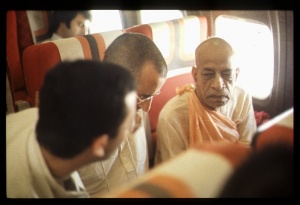SB 6.5.26: Difference between revisions
m (1 revision(s)) |
No edit summary |
||
| Line 1: | Line 1: | ||
{{info | {{info | ||
|speaker= | |speaker=Śukadeva Gosvāmī | ||
|listener=King | |listener=King Parīkṣit | ||
}} | }} | ||
[[Category:Srimad-Bhagavatam - Canto 06 Chapter 05]] | |||
[[Category:Bhagavatam Verses Spoken by Sukadeva Gosvami - Vanisource|060526]] | |||
<div style="float:left">'''[[Srimad-Bhagavatam]] - [[SB 6|Sixth Canto]] - [[SB 6.5: Narada Muni Cursed by Prajapati Daksa|Chapter 5: Nārada Muni Cursed by Prajāpati Dakṣa]]'''</div> | |||
<div style="float:right">[[File:Go-previous.png|link=SB 6.5.25]] '''[[SB 6.5.25]] - [[SB 6.5.27-28]]''' [[File:Go-next.png|link=SB 6.5.27-28]]</div> | |||
{{RandomImage}} | |||
==== TEXT 26 ==== | ==== TEXT 26 ==== | ||
<div | <div class="verse"> | ||
tad-upasparśanād eva | :tad-upasparśanād eva | ||
vinirdhūta-malāśayāḥ | :vinirdhūta-malāśayāḥ | ||
japanto brahma paramaṁ | :japanto brahma paramaṁ | ||
tepus tatra mahat tapaḥ | :tepus tatra mahat tapaḥ | ||
</div> | </div> | ||
| Line 16: | Line 22: | ||
==== SYNONYMS ==== | ==== SYNONYMS ==== | ||
<div | <div class="synonyms"> | ||
''tat''—of that holy place; ''upasparśanāt''—by bathing regularly in the water; ''eva''—indeed; ''vinirdhūta''—completely purified; ''mala-āśayāḥ''—of all the dirt within the heart; ''japantaḥ''—chanting or murmuring; ''brahma''—''mantras'' beginning with ''oṁ'' (such as ''oṁ tad viṣṇoḥ paramaṁ padaṁ sadā paśyanti sūrayaḥ''); ''paramam''—the ultimate goal; ''tepuḥ''—performed; ''tatra''—there; ''mahat''—great; ''tapaḥ''—penances. | |||
</div> | </div> | ||
| Line 23: | Line 29: | ||
==== TRANSLATION ==== | ==== TRANSLATION ==== | ||
<div | <div class="translation"> | ||
At Nārāyaṇa-saras, the second group of sons performed penances in the same way as the first. They bathed in the holy water, and by its touch all the dirty material desires in their hearts were cleansed away. They murmured mantras beginning with oṁkāra and underwent a severe course of austerities. | At Nārāyaṇa-saras, the second group of sons performed penances in the same way as the first. They bathed in the holy water, and by its touch all the dirty material desires in their hearts were cleansed away. They murmured mantras beginning with oṁkāra and underwent a severe course of austerities. | ||
</div> | </div> | ||
| Line 30: | Line 36: | ||
==== PURPORT ==== | ==== PURPORT ==== | ||
<div | <div class="purport"> | ||
Every Vedic mantra is called brahma because each mantra is preceded by the brahmākṣara (aum or oṁkāra). For example, oṁ namo bhagavate vāsudevāya. Lord Kṛṣṇa says in Bhagavad-gītā ([[BG 7.8]]), praṇavaḥ sarva-vedeṣu: "In all the Vedic mantras, I am represented by praṇava, or oṁkāra." Thus chanting of the Vedic mantras beginning with oṁkāra is directly chanting of Kṛṣṇa's name. There is no difference. Whether one chants oṁkāra or addresses the Lord as "Kṛṣṇa," the meaning is the same, but Śrī Caitanya Mahāprabhu has recommended that in this age one chant the Hare Kṛṣṇa mantra (harer nāma eva kevalam ([[CC Adi 17.21]])). Although there is no difference between Hare Kṛṣṇa and the Vedic mantras beginning with oṁkāra, Śrī Caitanya Mahāprabhu, the leader of the spiritual movement for this age, has recommended that one chant Hare Kṛṣṇa, Hare Kṛṣṇa, Kṛṣṇa Kṛṣṇa, Hare Hare/ Hare Rāma, Hare Rāma, Rāma Rāma, Hare Hare. | Every Vedic ''mantra'' is called ''brahma'' because each ''mantra'' is preceded by the ''brahmākṣara'' (''aum'' or ''oṁkāra''). For example, ''oṁ namo bhagavate vāsudevāya''. Lord Kṛṣṇa says in [[Bhagavad-gita As It Is (1972)|''Bhagavad-gītā'']] ([[BG 7.8 (1972)|BG 7.8]]), ''praṇavaḥ sarva-vedeṣu:'' "In all the Vedic ''mantras'', I am represented by ''praṇava'', or ''oṁkāra''." Thus chanting of the Vedic ''mantras'' beginning with ''oṁkāra'' is directly chanting of Kṛṣṇa's name. There is no difference. Whether one chants ''oṁkāra'' or addresses the Lord as "Kṛṣṇa," the meaning is the same, but Śrī Caitanya Mahāprabhu has recommended that in this age one chant the Hare Kṛṣṇa ''mantra'' (''harer nāma eva kevalam'' ([[CC Adi 17.21]])). Although there is no difference between Hare Kṛṣṇa and the Vedic ''mantras'' beginning with ''oṁkāra'', Śrī Caitanya Mahāprabhu, the leader of the spiritual movement for this age, has recommended that one chant Hare Kṛṣṇa, Hare Kṛṣṇa, Kṛṣṇa Kṛṣṇa, Hare Hare/ Hare Rāma, Hare Rāma, Rāma Rāma, Hare Hare. | ||
</div> | </div> | ||
__NOTOC__ | |||
<div style="float:right; clear:both;">[[File:Go-previous.png|link=SB 6.5.25]] '''[[SB 6.5.25]] - [[SB 6.5.27-28]]''' [[File:Go-next.png|link=SB 6.5.27-28]]</div> | |||
__NOTOC__ | |||
__NOEDITSECTION__ | |||
Revision as of 10:42, 12 May 2021

A.C. Bhaktivedanta Swami Prabhupada
TEXT 26
- tad-upasparśanād eva
- vinirdhūta-malāśayāḥ
- japanto brahma paramaṁ
- tepus tatra mahat tapaḥ
SYNONYMS
tat—of that holy place; upasparśanāt—by bathing regularly in the water; eva—indeed; vinirdhūta—completely purified; mala-āśayāḥ—of all the dirt within the heart; japantaḥ—chanting or murmuring; brahma—mantras beginning with oṁ (such as oṁ tad viṣṇoḥ paramaṁ padaṁ sadā paśyanti sūrayaḥ); paramam—the ultimate goal; tepuḥ—performed; tatra—there; mahat—great; tapaḥ—penances.
TRANSLATION
At Nārāyaṇa-saras, the second group of sons performed penances in the same way as the first. They bathed in the holy water, and by its touch all the dirty material desires in their hearts were cleansed away. They murmured mantras beginning with oṁkāra and underwent a severe course of austerities.
PURPORT
Every Vedic mantra is called brahma because each mantra is preceded by the brahmākṣara (aum or oṁkāra). For example, oṁ namo bhagavate vāsudevāya. Lord Kṛṣṇa says in Bhagavad-gītā (BG 7.8), praṇavaḥ sarva-vedeṣu: "In all the Vedic mantras, I am represented by praṇava, or oṁkāra." Thus chanting of the Vedic mantras beginning with oṁkāra is directly chanting of Kṛṣṇa's name. There is no difference. Whether one chants oṁkāra or addresses the Lord as "Kṛṣṇa," the meaning is the same, but Śrī Caitanya Mahāprabhu has recommended that in this age one chant the Hare Kṛṣṇa mantra (harer nāma eva kevalam (CC Adi 17.21)). Although there is no difference between Hare Kṛṣṇa and the Vedic mantras beginning with oṁkāra, Śrī Caitanya Mahāprabhu, the leader of the spiritual movement for this age, has recommended that one chant Hare Kṛṣṇa, Hare Kṛṣṇa, Kṛṣṇa Kṛṣṇa, Hare Hare/ Hare Rāma, Hare Rāma, Rāma Rāma, Hare Hare.